MIT SCHOOL OF HUMANITIES, ARTS, AND SOCIAL SCIENCES
Media + Awards Digest | January 2021

The Media + Awards Digest is a section of the Said and Done newsletter. Subscribe
Office of the Dean | 19 January 2021
Dear Friends,
The attack on the U.S. Capitol on January 6th has shaken our community. Political leaders and citizens alike are now debating measures to repair and strengthen our democracy so the voices of reason, fact, integrity — and a commitment to democracy itself — prevail. As scholars and educators, our role in this endeavor is paramount. For citizens to participate meaningfully in a democracy, they must, as political scientist Robert Dahl once wrote, “understand their own interests, know the relevant facts, and have the ability to critically evaluate political arguments. Each of those things presupposes education.”
In early December, the MIT Election Lab’s ongoing analysis of election administration (ballot deadlines, voter waits, etc.) turned to the Georgia Senate runoffs, and their findings again demonstrated that, from an operational standpoint, the U.S. election administrators produced the most secure election in American history. Election Lab director and Professor of Political Science Charles Stewart III also discussed various responses to the President’s role in the January 6th events in a Cognoscenti opinion piece. Appearing on Boston’s NBC affiliate, Professor of History Chris Capozzola gave perspective on the 25th Amendment as well as the global implications of the attack on the U.S. Capitol.
On a question of governance and oversight, political scientist and security studies expert Vipin Narang answered questions from The Washington Post on the authorization of nuclear strikes. Health and innovation economist Jonathan Gruber joined Boston Public Radio to discuss Covid-19 relief. For his research on equitable vaccine distribution, economist Parag Pathak was featured along with two Boston College colleagues in BC News.
On matters of the media and arts, Professor of Comparative Media Studies Heather Hendershot was interviewed by The Guardian about potential changes at Fox News post-January 20. MTA Senior Lecturer Ken Urban’s play Vapor Trail, about grief and recovery, was featured by The Playwrights’ Center. And when asked, on Wisconsin Public Radio, about managing the multiple stresses of these historic and eventful times, Professor of Philosophy Kieran Setiya offered some wise words:
“It’s not self-indulgent to cling to the beauty and meaning of art, friendship and family, and personal connections in times like this.”
With kind regards,
Melissa
Melissa Nobles
Kenan Sahin Dean
Professor of Political Science
MIT School of Humanities, Arts, and Social Sciences
HONORS AND AWARDS
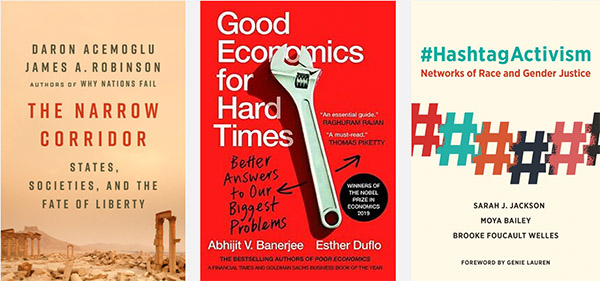
ECONOMICS
Foreign Affairs names two books by MIT economists among the best of 2020
Both Good Economics for Hard Times, by Abhijit Banerjee and Esther Duflo, and The Narrow Corridor, by Daron Acemoglu and James A. Robison, are named among the best books of 2020 by Foreign Affairs.
About the Awards at Foreign Affairs | Good Economics for Hard Times | The Narrow Corridor
WOMEN'S AND GENDER STUDIES | MLK VISTING PROFESSOR
Hashtag Activism named McGannon Center book of the year | Moya Bailey
The book "stands out for [how] explains the ways networks of black and brown people, women, and other historically subordinated groups have 'birthed and nourished counterpublics on social media' helped resist 'antidemocratic disinformation' and 'contested ideologies of domination in the U.S.'"
About the Award | Hashtag Activism
ECONOMICS AND J-PAL
Esther Duflo named chair of new French development innovation fund
France starts a Fund for Innovation in Development, chaired by Professor Duflo, to test and scale up solutions to poverty and inequality, a move its founders hope will transform the country’s approach to aid.
Announcement at Devex
MUSIC
"Faces of Souls" honored by New York Jazz Recording | Mark Harvey
The Aardvark Ensemble's latest CD, featuring new music by Harvey on themes of democracy, justice and equality, has been named a "Best of 2020."
Aardvark Jazz Orchestra | About the CD | Preview: Listen to "Sisyphus"
GLOBAL LANGUAGES
Joseph Borkowski receives Infinite Mile Award
Global Languages Instructional Technologist Borkowski has received an Infinite Mile Award from MIT IS&T. The GL team says Borkowski's "recognition of synergy between language pedagogy and technology has made him indispensable!"
Announcement from MIT Global Languages

Joseph Borkowski, Instructional Technologist, MIT Global Language program
MEDIA DIGEST
DEMOCRACY
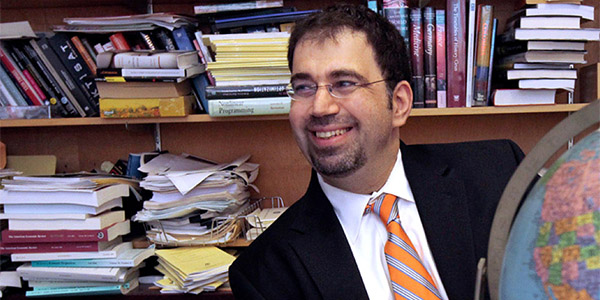
Economist Daron Acemoglu, Institute Professor
NPR/NATIONAL PUBLIC RADIO
Why Nations Fail, America Edition | Daron Acemoglu
"We wanted to figure out if the insurrection is a sign our nation is failing, and, if so, if there's anything we can do about it. So we called up the authors of Why Nations Fail. "I don't think January 6th was a singular day of failure," says MIT economist Daron Acemoglu, who co-authored the book with University of Chicago economist James Robinson. "What surprises me is why it took until January 6th." Drawing on decades of economic research, Why Nations Fail argues that political institutions — not culture or natural resources or geography — explain why some nations have gotten rich while others remain poor.
Commentary at NPR
NPR | WBUR
The case for censure | Charles Stewart III
"Dealing with our current crisis requires creating the conditions for electoral politics to marginalize opponents of constitutional government," writes MIT professor and election expert Stewart, describing Congressional censure.
Commentary at WBUR
THE WALL STREET JOURNAL
Investors assumed democracy would endure | Daron Acemoglu
Enacting policies, which requires some degree of bipartisanship and agreement on facts, will grow harder “if polarization continues in this country,” said Acemoglu.
Story at The Wall Street Journal
NBC
MIT historian on the violence at Capitol Hill | Chris Capozzola
Capozzola explains why he thinks removing President Trump by invoking the 25th Amendment would be “difficult.”
Commentary at NBC
THE GUARDIAN
How the much-litigated ballot deadlines impacted the election | Charles Stewart III
There's always a deadline, and there are good reasons for why it should just be election day, said Stewart. “One is the optics issue that arose in this election,” he said. Ballots that arrive after the election give fodder to those who want to undermine the legitimacy of the voting process.
Story at The Guardian
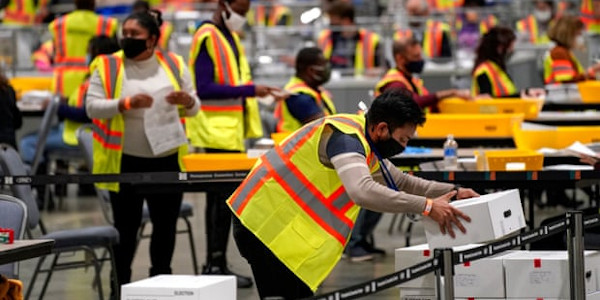
Election workers, Pennsylvania convention center; photo via The Washington Post/Getty Images
THE GUARDIAN
Fox News support for the presidency will now change | Heather Hendershot
“Of course we can expect it to be relentlessly negative, but it’s a challenge on some levels, because [President-elect Biden] is a 78-year-old White man, with a fairly moderate history,” said Hendershot, a professor of film and media at MIT who studies conservative and rightwing media.
Story at The Guardian
CBS
Who turned out for Warnock and Ossoff in Georgia? | Charles Stewart III
An analysis by Charles Stewart of MIT showed Warnock over-performed Ossoff by relatively more in Democratic precincts and in precincts with more White voters, suggesting that straight-ticket Democratic voting was less common among White voters than among Black voters.
Story at CBS
THE NEW YORK TIMES
Long waits to vote in America's poorest neighborhoods | MIT Election Lab
The 2020 Survey of the Performance of American Elections (SPAE), conducted by the MIT Election Data and Science Lab, found that long waits were much more common among early voters than they were on Election Day. The SPAE found that 14 percent of Election Day voters waited more than 30 minutes to vote — an increase from 2016.
Story at The New York Times
ECONOMICS
THE ECONOMIST
Research shows the robots are stealthily coming for jobs | Daron Acemoglu, David Autor
Since 2010 there has been substantial growth in the number of AI-related job vacancies advertised by firms with lots of AI-vulnerable jobs. At the same time, there has been a sharp decline in these firms' demand for capabilities that compete with those of existing AI.
Story at The Economist
THE ECONOMIST
The case for more government spending on R&D | Jonathan Gruber, Simon Johnson
"Today plenty of people reckon that the government can help unlock further inventions. In their book Jump-starting America, MIT economists Jonathan Gruber and Simon Johnson highlight synthetic biology, hydrogen, and deep-sea mining."
Story at The Economist
CRITICAL RESPONSE
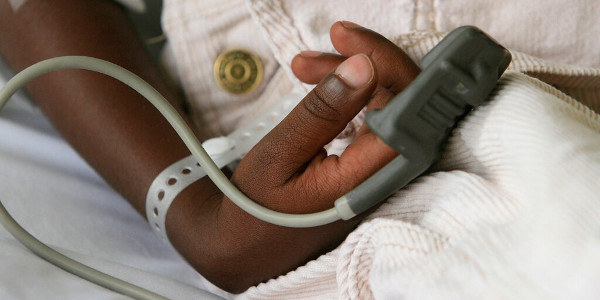
Pulse oximeters detect oxygen in the blood; photo via The New York Times/BSIP SA/Alamy
THE NEW YORK TIMES
Pulse oximeters have higher error rate in Black patients | Amy Moran-Thomas
A study showed that the devices, which measure oxygen levels in the blood, were three times more likely to give misleading readings among African-American patients.
Story at The New York Times
NPR / WPR
Good Riddance: Philosophy for a terrible year | Kieran Setiya
"Let’s face it, 2020 has been a garbage pile." MIT philosopher Kieran Setiya discusses what we can learn about ourselves and our world from this hard year.
Commentary at Wisconsin Public Radio
WIRED
How old-school text adventures inspired our virtual spaces | T.L. Taylor
While graphical MMORPGs have since overtaken the market, this does not mean players weren't having immersive experiences in text—some would even say they were more immersive, says T. L. Taylor. “You could have embodied experiences, a sense of presence, and shared space."
Story at Wired
THE ARTS
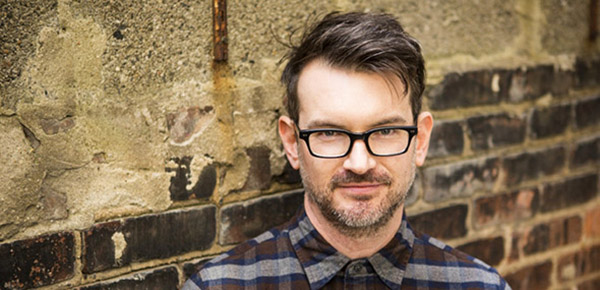
Ken Urban, Senior Lecturer, Dramatic Writing, MIT Theater Arts
PLAYWRIGHTS' CENTER
A conversation with Ken Urban about Vapor Trail
Playwrights' Center Associate Artistic Director Hayley Finn talks with playwright and MIT Senior Lecturer Ken Urban about his forthcoming audio play.
Interview at Playwrights' Center | Ken Urban website
SECURITY STUDIES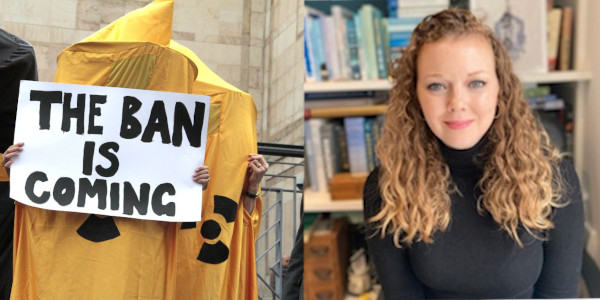
L: Pro-ban activists during UN meeting; photo, Tim Wright; R: Heather Williams, Stanton Nuclear Security Fellow
WAR ON THE ROCKS
What the nuclear ban treaty means for America's allies | Heather Williams
"Whether or not the treaty delivers on its disarmament promises or has a major impact on U.S. or NATO nuclear postures ultimately depends on what its members and supporters do next and if it can prove that it is more than just a symbolic protest against the nuclear status quo."
Commentary at War on the Rocks
THE WASHINGTON POST
No legal way to stop a U.S. President from ordering a nuclear strike | Vipin Narang
Despite reports that Pelosi received assurances that there are safeguards in place in the event the President of the United States wants to launch a nuclear weapon, any such meaningful or effective safeguards would be illegal.
Commentary at The Washington Post
THE BOSTON GLOBE
A more general anxiety: Gun sales soared nationwide in 2020 | John Tirman
Tirman said he believes US gun sales were up in 2020 due to a “general instability of society.” “It does relate to the election," he said, "and Trump, and the possibility that Biden could try to enact gun control, but I think it is a more general anxiety.”
Story at The Boston Globe
CNN
Taiwan's planned submarine fleet could forestall a Chinese invasion | Owen Cote
"Chinese ASW capabilities are weak and the acoustic conditions in these very shallow, noisy waters are very difficult even for advanced ASW capabilities like those deployed by Japan and the US," said Cote, associate director of the Security Studies Program.
Story at CNN
PANDEMIC-RELATED MEDIA
At-A-Glance List of Pandemic-related Media Publications from MIT SHASS
An ongoing list of commentaries from our School community to inform policy and to increase public understanding of the pandemic.
Collected Publications
VACCINE DISTRIBUTION
HEALTH ECONOMICS
The equity of vaccine distribution | Parag Pathak and colleagues
"One concern is that although disadvantaged communities carry most of the COVID impact burden, they will not be able to receive their share [of vaccines]...fast enough." BC News spotlights research on vaccine equity by MIT Professor Parag Pathank and M. Utku Unver, Tayfun Sönmez, and M. Bumin Yenmez of Boston College.
Paper at Boston College website
ECONOMICS
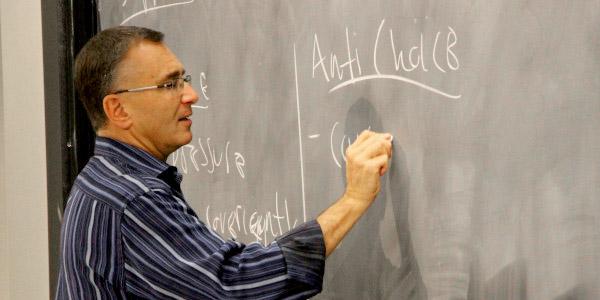
Jonathan Gruber, Ford Professor of Economics at MIT; photo by Laura Kerwin, MIT Center for International Studies
BOSTON PUBLIC RADIO
Breaking down the latest COVID-19 relief package | Jonathan Gruber
Health and innovation economist Gruber broke down the economics behind Congress' latest COVID-19 relief package and discussed his research into March's CARES Act, where he found that unemployment insurance has had more of an impact on keeping jobs and stimulating the economy than Paycheck Protection Program loans.
Commentary at Boston Public Radio
EDUCATION | DURING AND AFTER THE PANDEMIC
THE WASHINGTON POST
The great academic catch-up | J-PAL North America
Research — including a recent meta-analysis of 96 tutoring programs by J-PAL North America, an MIT lab focused on poverty issues — suggests that well-executed tutoring programs are effective at helping students catch up quickly, even more than other large-scale interventions (including reducing class sizes, providing additional training for teachers or purchasing new curriculums).
Coverage at The Washington Post
The Media + Awards Digest is a section
of Said and Done, the School's online digest.
EXPLORE
Follow us




Subscribe to Said and Done
10 issues a year. Sometimes 11!
Making a Better World
Basic Research | Citizenship | Computing and AI | Education
Health of the Planet | Human Health | The Human Factor
Arts Innovation | Social Innovation
Perspectives for the Pandemic
Explore the Series
Making a Just Society
Explore the Resources
Solving Climate
Browse the Series
Ethics, Computing, and AI
Browse the Series
Computing and AI: Humanistic Perspectives from MIT
Browse the Series
MIT Climate website
A major source of research, innovation, and discussion
Join us
SHASS on MIT News
Research and Features
MIT Campaign for a Better World
Story | Join Us

Published by SHASS Communications
Office of the Dean, MIT School of Humanities, Arts, and Social Sciences
Editor and Designer: Emily Hiestand
Publication Associate: Alison Lanier
Media Relations Manager: Stephen Oakes
Published 19 January 2021